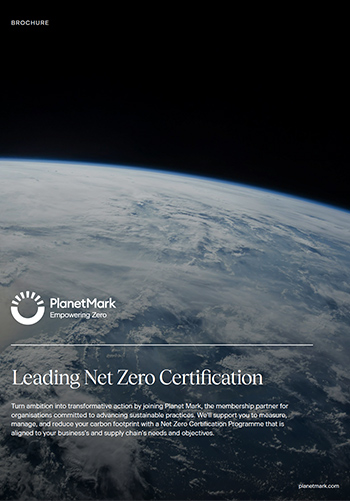SERVICES / NET ZERO
Achieve net zero with our Net Zero Certification Programme
At Planet Mark we’re proud to offer a unified solution that’s accessible to all. Our Net Zero Certification Programme represents not just a milestone, but a natural next step for businesses committed to sustainability.

BENEFITS
Why choose our Net Zero Certification Programme?
Future-proof your business
Measure and reduce your carbon emissions to drive positive incremental change, with support from the experts shaping Net Zero Certification.
Strengthen your supply chain
Become an industry leader within your supply chain, win tenders from sustainability driven clients, and network with like-minded businesses in our Members community
Attract customers, investors and talent
Engage stakeholders, and demonstrate that you care about your business’s impact on society.
Maintain Competitive Advantage
Stay at the forefront of sustainable commercial business initiatives to ensure long term success.
HOW IT WORKS
Your path to net zero certification
Our Net Zero Certification Programme guides you through four certified milestones to complete Planet Mark Net Zero Certification.
LEVEL ONE
Supporting you to measure your full carbon footprint
The first step on your journey is Planet Mark Certified – Business, where we will support you to measure your Scope 1, Scope 2 and Scope 3 carbon emissions. This then provides you with your net zero baseline.


LEVEL TWO
Expert guidance for your transition to net zero
Once you have your net zero baseline, we will support you to set realistic but ambitious near-term and long-term net zero targets and develop a transition plan to enable your advancement to Planet Mark Certified – Net Zero Committed.


LEVEL THREE
Tracking your progress towards net zero
Annual progress reports will track progress against your near-term targets, and determine your readiness to move to the third milestone: Planet Mark Certified – Net Zero Aligned.


LEVEL FOUR
Achieving and maintaining net zero
Upon achieving your long-term net zero targets and neutralising the residual emissions with carbon removal offsets, you will be eligible to move to become Planet Mark Certified – Net Zero Achieved.

PROGRAMME DETAILS
What’s included in the Net Zero Certification Programme?
Working towards net zero isn’t a tick-box exercise. That’s why each milestone in our Net Zero Certification Programme is rooted in our Measure, Engage, Communicate model, which guides Members through an on-going business transformation.
Measure
- Data platform & toolkits – To guide you through the data collection process.
- Data Collection Pack – A collection datasheets and tutorials for each emissions source
- Data drop-ins – Meet with our expert sustainability team, receive guidance, troubleshoot issues, and get personalised advice.
Engage
- Planet Mark Academy – Guides, toolkits and empower your organisation to make measurable progress.
- Networking events – Join us for monthly workshops, webinars and in-person events.
- Stakeholder support – Engage your employees, senior management and supply chain with our support.
Communicate
- Welcome pack – Helping you to understand how to begin your sustainability journey.
- Marketing toolkit – Media assets and guidelines to enable your marketing team to communicate your sustainability credentials with confidence.
- Best practice guides – Covering a variety of industries and operational functions, these guides are designed to help you implement proven solutions to common environmental challenges.
BROCHURE
Empowering organisations to solve the climate crisis

Inside this brochure you’ll find:
- The benefits of a net zero journey
- How the Net Zero Certification Programme works
- What’s included in your Planet Mark membership
Transforming ambition into action together
Driving Incremental Change with a Sustainability Strategy at Fox Williams
Bywaters – A sustainability transformation | Planet Mark
Fooditude – A journey to sustainable catering | Planet Mark
Penningtons Manches Cooper – Net zero journey | Planet Mark
Fortnum & Mason: A Legacy of Responsibility
Sherborne Girls: A School at the Forefront of Sustainability
Sanderson Design Group – A success story | Planet Mark
Impress Print – A sustainability journey | Planet Mark
Mount Anvil – Building a sustainable legacy | Planet Mark
Prologis – A journey to net zero buildings | Planet Mark
Total Office – A sustainability transformation | Planet Mark
Sleepeezee – Path to responsible manufacturing | Planet Mark
Hillier Nurseries: Planting the seed for a sustainable future
Trusted by 800+ organisations
Start your net zero journey today
Net Zero Certification Programme FAQs
How does the Net Zero Certification Programme work?
What happens to my current Planet Mark membership?
Existing members will be invited to transition onto a membership package at your next renewal date and your Planet Mark journey will continue as normal until then. Once you have moved onto a suitable membership package, you will be part of Planet Mark’s new Net Zero Certification Programme. Please contact the Member Success team at [email protected]
Which frameworks does Planet Mark align to?
Our Net Zero Certification Programme is officially recognised by the UNFCCC as a Cooperative Climate Initiative and is aligned with the principles of the Science Based Targets initiative Corporate Net Zero Standard. Planet Mark’s measurement methodology is fully aligned to Greenhouse Gas (GHG) Protocol and all data is verified with evidence provided by the Member.
For climate legislation support, including SECR and ESOS please see our bespoke services designed to meet your compliance requirements.
What support is available for my organisation?
Planet Mark Members will receive comprehensive support to progress through the 4 levels of certification in our Net Zero Certification Programme. This includes guides and toolkits, employee training, data support, educational drop-in sessions, Member networking events and ongoing guidance from our sustainability experts.

Still have questions?
Contact us for more information about our Net Zero Certification Programme

